#Aurland
Explore tagged Tumblr posts
Text

U n d r e d a l
31 notes
·
View notes
Photo

25 notes
·
View notes
Text
I wanted to make this post because we don’t see a lot of asexual characters in western media and despite him being from a hugely popular show (Seaside Hotel) you’re unlikely to know of his existence if you’re not from Denmark.
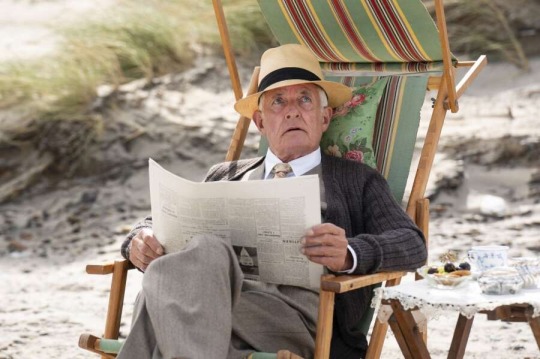
His name is Hjalmar Aurland and he’s one of the more sympathetic and realistic asexual characters I’ve seen. He lives in a time and place where asexuality as a concept doesn’t exist yet so he’s never labeled as such but rewatching the show made me realize that he acts exactly like the asexual people I personally know. Asexuality can mean a lot of things but his specific brand isn’t naive to sex nor is he repulsed by sex, sexual desire or thoughts simply doesn’t come naturally to him.
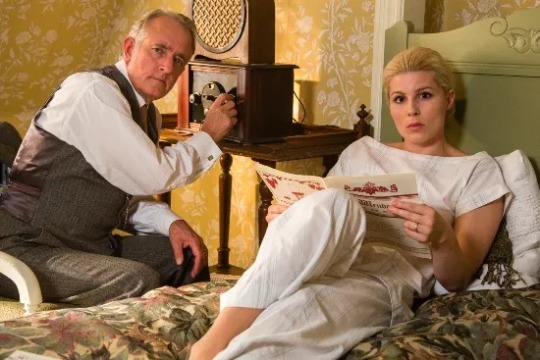
He can be convinced to have sex with his wife Helene but only if she appeals to their emotional bond. Just so you don’t get the wrong idea, he’s not being forced or emotionally blackmailed to sleep with her. It’s simply that he understands sex is a way to show emotional love too and he wants to express that love for Helene when it’s important to her, and seeing as sex isn’t unpleasant to him, just kinda boring, he’s willing to do that for her.
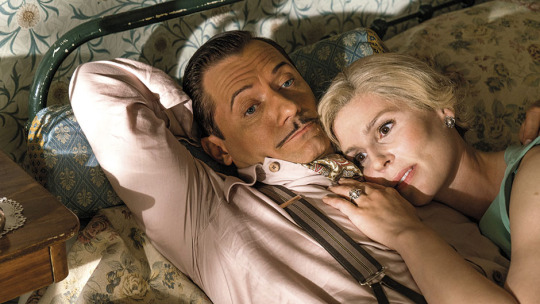
Unfortunately that isn’t enough for Helene and despite her love for Hjalmar she starts an affair with the dramatic and emotional actor Edward Weyse. He has a string of relationships, marriages and divorces behind him because despite what it may look like from the outside Edward doesn’t really want shallow sexual relationships. He just can’t help himself and keep falling in love with women left and right, fully and wholeheartedly, only to be dumped or dump them once the initial excitement has passed.
So Helene and Edward’s affair that was only meant to satisfy their carnal desires quickly becomes romantic. Helene feels torn between him and Hjalmar who she still loves and Edward understands the difficult situation they’re both in while also feeling jealous of Hjalmar. And Hjalmar? He doesn’t catch on for years. He’s not stupid but his brain just doesn’t jump to sex. He just assumes they’re good friends and why shouldn’t his wife be allowed to have friends, even male ones? Things get really complicated when Helene gets pregnant and she has to have sex with Hjalmar so he won’t wonder how it happened. Edward even has to join in on the seduction, reminding Hjalmar how much Helene loves him, even though it breaks Edward’s heart to do so.
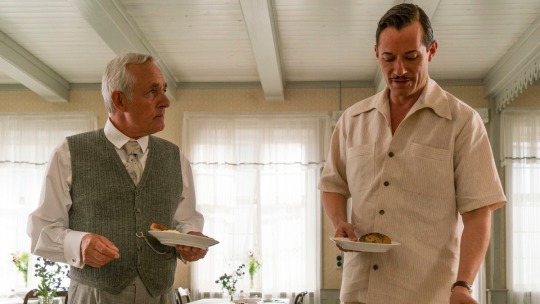
But like I’ve said Hjalmar isn’t stupid. He saw the signs but chose to ignore them until one night when Helene accidentally says Edward’s name. It breaks the dam in Hjalmar’s denial and he has to face that deep down he always knew. Overcome by sadness and betrayal he wanders off into the night in nothing but his nightgown and gets a room at a different hotel where he can think in peace. Eventually he agrees to return to the first hotel with Helene and Edward and decides to take control of the situation.
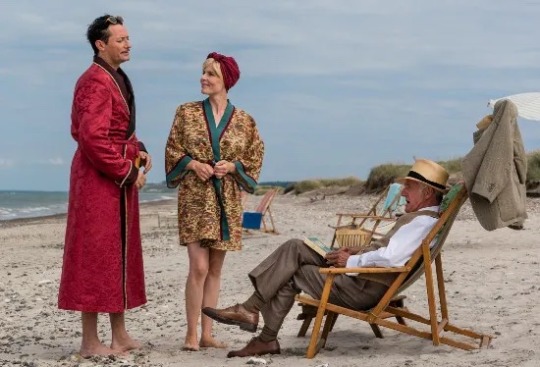
He sits them both down and tells them that he understands that the three of them share a bond and that there are things he can’t really do for Helene so from now on he wants their relationship to be open and honest. He wants Helene and Edward to keep seeing each other and Edward is welcome in their house, but Hjalmar wants to be allowed to call Edward by his first name and makes it very clear that Helene and Edward’s children “belong to him” because he still thinks of himself as their dad and loves them as his own children. Both Helene and Edward agrees to it, though the emotional Edward is very flustered and confused by the acceptance and love he’s being shown by Hjalmar.
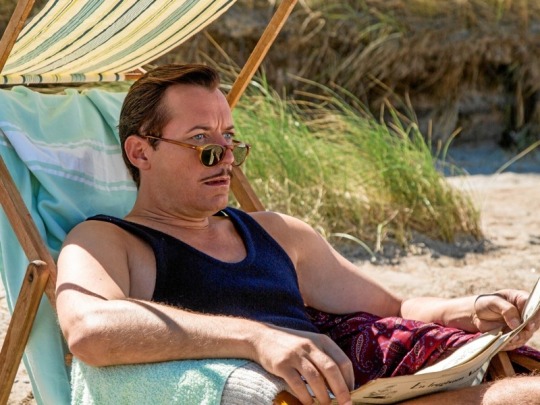
This is obviously a very tv drama situation but I was so stuck by how much Hjalmar acts like my asexual friends. Having a lover for your partner isn’t the most common solution but it’s an idea I’ve heard a lot of asexual people be open to under the right circumstances and of course that’s the most dramatic solution for a romantic tv drama.
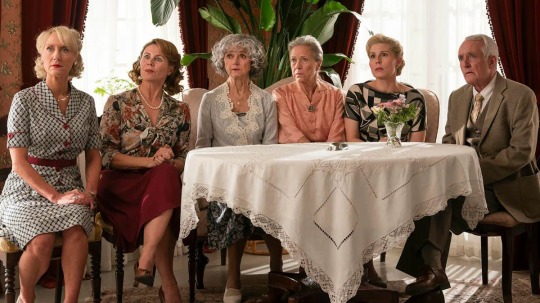
Hjalmar is defined by so much more than his sexuality though. His main characteristic is his passion for social justice and equality, and other than some early show weirdness before they really cemented the characters, Hjamler is the only character who floats freely between the men and women. He’s just as likely to sit with the men as he is the women, often appearing in otherwise entirely female spaces. It’s never questioned or even brought up, not because he’s a “safe asexual” but because he cares and think their worries are as important as the men’s. He’s often called a pessimist by the other men when in reality he is determined to be hopeful and compassionate and spread the love he feels the world is lacking as WWII draws closer.
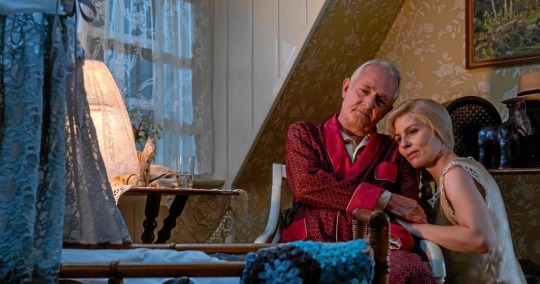
So yeah, I just wanted to share this sweet ace guy with you because you probably wouldn’t have known about him otherwise.
5K notes
·
View notes
Text

Aurland, Norway
0 notes
Text
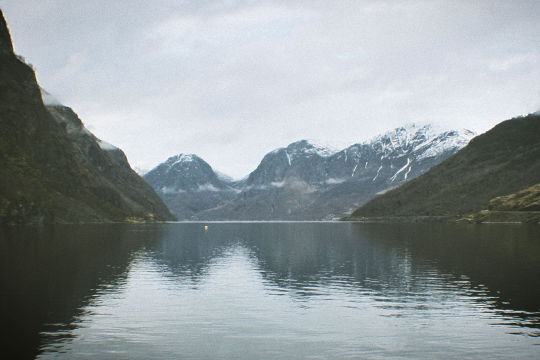
1 note
·
View note
Text

Flåm, Norway: Flåm is a village in the Flåmsdalen valley which is located at the inner end of the Aurlandsfjorden, a branch of Sognefjorden. The village is located in Aurland Municipality in Vestland county, Norway. In 2014 its inhabitants numbered 350. Wikipedia
78 notes
·
View notes
Text


Aurland, Norway
25 notes
·
View notes
Text
16.06.2023 Tag 8 in Norwegen 🇳🇴 Heute fuhren wir weiter Richtung Aurland. (Gefahren sind wir seit zuhause tatsächlich schon über 2.000 km!) Wir kamen wieder durch unzählige Tunnel und kamen an vielen, vielen Wasserfällen vorbei. Ich glaube wir hatten noch keinen Tag hier, an dem wir keinen gesehen haben. Die gibt es echt wie Sand am Meer. An einem kleinen Bach füllten wir unsere Duschwasserreserven wieder auf. Der zusätzliche Kanister ist echt Gold wert (danke Pap 😘). Weiter ging es zum Stegastein Aussichtspunkt. Es ging steil die Serpentinen hoch. Die Strecke dort hin war sehr schmal und es kamen uns einige Autos und Camper entgegen. 😱 Wenn ich das vorher gewusst hätte, wären wir wohl besser den 24,5 km langen Tunnel (im Jahr 2000 der längste Tunnel der Welt) nach Lærdal gefahren. 🥵 Nach ca. 20 Minuten Höllenstraße sind wir angekommen und die Aussicht war wirklich unglaublich schön - es hat sich also gelohnt. Aber es war ziemlich viel los und die Sonne brutzelte erbarmungslos vom Himmel. Wir machten uns weiter bergauf und kamen wieder bis auf 1.300 Höhenmeter. Die Schneefelder wurden immer größer und die Landschaft immer karger. Nach einem lauten Poltern von hinten aus der Wohnkabine hielten wir an und sahen, dass es die Halterung der Schranktüre aus dem Küchenblock gerissen hatte. Wir versuchten es zunächst mit Spanngurten zu fixieren, überlegten uns allerdings schnell etwas anderes, da es nicht richtig hielt. Wir fanden schließlich eine Lösung und mussten dafür aber unser Topfuntersetzerhölzchen opfern. Wir hielten uns noch eine Weile an dem Parkplatz mit traumhafter Aussicht auf und aßen noch Mal Wraps (mit Wonderburger) zu Mittag. Es war zu diesem Zeitpunkt tatsächlich schon fast 16 Uhr 😅. Dadurch das die Sonne immer hoch steht, verliert man jegliches Zeitgefühl. Danach ging es wieder bergab. An Straßenrand grasten immer wieder einige Schafe. 🐑 Zwischendurch hielten wir noch mal auf einem Parkplatz an und liefen zu einer kleinen Höhle, in der ein künstlicher Bär lag, außenrum lauter Campingartikel. Wir wissen allerdings nicht, welche Bedeutung dies hatte. Nach weiteren 20 km sind wir endlich wieder an einen Fjord gekommen. Die Bremsen waren schon ganz heiß gelaufen. Nun war das nächste Ziel die Stabkirche von Borgund. Diese wurde ca. 1150 gebaut und blieb seitdem so gut wie unverändert. Wir kamen leider zu spät dort an und konnten die Kirche nur aus der Ferne bestaunen. Das Gelände ist komplett abgesperrt und mit Kameras überwacht. Mittlerweile stehen wir in einer kleinen Parkbucht am Fjord schrieben den Blog und planen den nächsten Tag. 😊
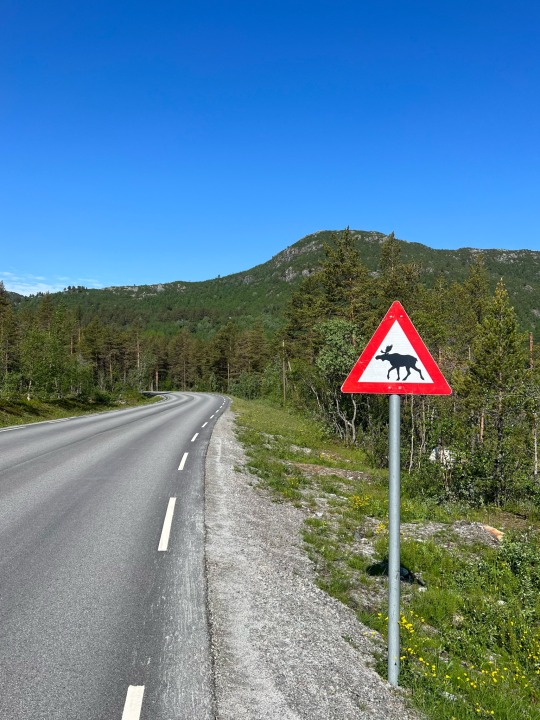


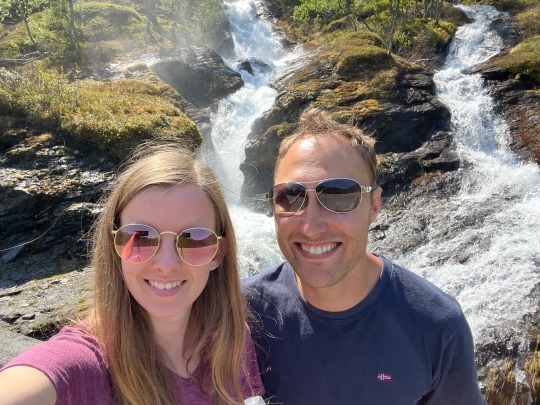
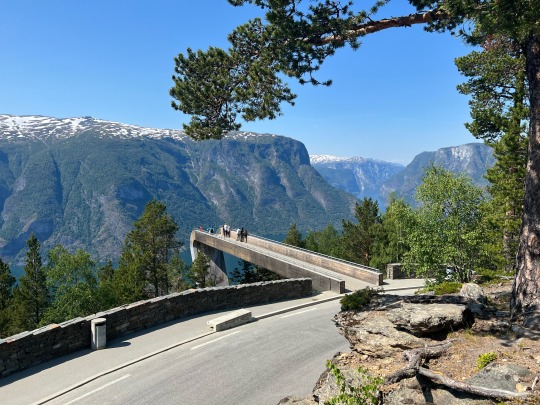


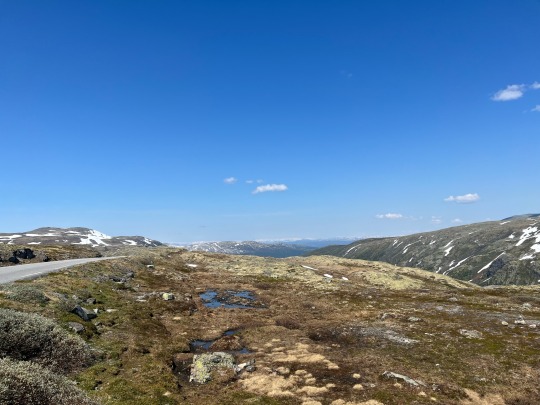
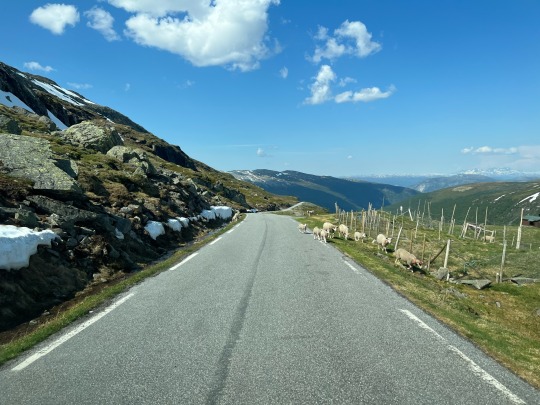
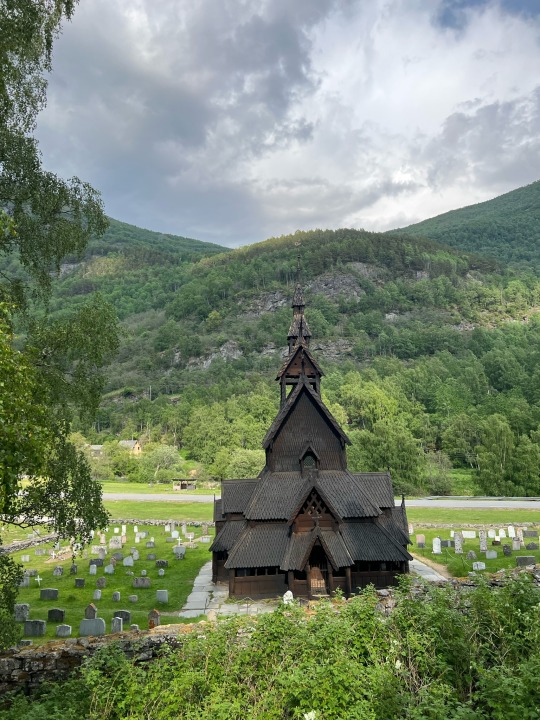
2 notes
·
View notes
Text















Hei hei! Nach knapp 1,5 Monaten in meinem neuem temporären Zuhause hier mal wieder ein paar Impressionen:)
Fotos 1-6: Mit 2 anderen Erasmusstudis war ich in Aurland an einem wunderschönen Fjord und Wasserfall, das waren viele sehr beeindruckende Anblicke.
Fotos 7-9: Hier war ich mit letztem warmen Wetter noch baden und habe in der Hängematte gelegen.
Foto 10: Wann immer das Wetter gut ist (und ich hatte bisher wirklich viel Glück mit dem Wetter), geh ich wandern. Mit den Öffis bin ich super schnell in der Natur rund um Oslo.
Foto 11: Ausblick auf das Opernhaus von einem Sessel in der Deichman Bibliothek aus. Diese hat vor ein paar Jahren den Preis für die beste europäische Bibliothek bekommen und ist allein architektonisch schon beeindruckend.
Foto 12: Stadtspaziergang.
Foto 13: Nordlichter! Meine Mitbewohnerin Daphne und ich vor dem See "Songsvann" und den Nordlichtern. Ich hoffe, dass ich bald nochmal die Chance bekomme, welche zu sehen, das hängt von Sonnenwinden ab und natürlich davon, ob es bewölkt ist.
Foto 13+14: Essen! Es geht weiter mit Zimtschnecken, die besten habe ich bisher in einem Café mitten im Wald entdeckt. Und ich war das erste Mal im Wald Pilze sammeln, wir haben viele Pfifferlinge gefunden und daraus hab ich mir eine leckere Pastasauce gemacht.
Viele Grüße aus Oslo, ich vermisse euch! <3
0 notes
Text
Norway & Scandinavia Travel Tips
Oslo | Flam Train | Nærøyfjord & Sognefjord | Bergen | Copenhagen | Malmo, Sweden | Norway travel tips

Since our kids loved Iceland so much, I tried to find other destinations with beautiful nature and temperate weather. Norway topped the list with its famous fjords.
Summer is a great time to go due to the long days. Weather wise, note the west fjord part of Norway including Bergen rain a lot. But at least when we were there it was mostly showers, rain and sun, except for 1 day when it rained on and off.
FLIGHTS
I usually find flights on Google Flights. The Explore Option can give you the best price in the next 6 months for your destination of choice. So right now it says it's $417 to go to Bergen round trip in early November and only $304 to go to Copenhagen in mid September. We spent more to go in August during kids' vacation.

GETTING AROUND
There is a Norway in a Nutshell route that you can do on your own (probably cheaper), with trains to the fjords and fjord cruise. We did just that, flying into Oslo with a stopover in Copenhagen. Then you can buy:
Train ticket from Oslo S to Flam Stasjon on Vy. This is really two trains: from Oslo to Myrdal (5 hours) on Bergen Railway, and from Myrdal to Flam (1 hour) on Flam Railway. In the summer, ticket can cost $150 per person.
Fjord cruises (typically 2 hours) from Flam to Gudvangen. We actually didn't do that, and chose to do kayak tour from Nordic Ventures leaving from Gudvangen. You can also rent a boat from Flam here to drive yourself.
Bus from Flam or Gudvangen to Voss then train to Bergen. We actually didn't quite do that either, and took a Ferry on Norled from Flam, to see more of the Sognefjord. The ferry costs $50, takes 5 hours so not as fast as the bus/train option.
One thing to note about buying train tickets on Vy, they only take European credit cards or Paypal.
Getting around in Bergen or Oslo is super easy, there's metro and Uber everywhere, and taxi from the airport. Getting around the Flam / fjord area isn't as easy. There's no Uber and we read you'd have to book taxis ahead. We ended up riding buses around, and that took planning too. Different buses operate on different schedule. You can see the options at Skyss (buy onboard) or Norways Best.
Last but not least, did you know that about a quarter of cars in Norway are electric vehicles! And over 80% of new cars sold in Norway were EVs. So we got rides in Tesla Ubers and an electric Mustang. The Tesla driver was proud and loves it. The immigrant driver of the Mustang did complain that he'd prefer a gas car that feels more like a real car. ;-)
WHERE TO STAY
We stayed in Airbnbs for most of the trip. It costs generally about $500 a night for our extended family of 6 in the most central locations. More affordable compared to our other travel choice, Banff, Canada. The only exception is Flam: limited selection and lots of travelers. We ended up staying in Aurland for a more peaceful and scenic town and paid a bit more. Another budget option is Gudvangen cabins that cost about $130 per night for 4 people.
THINGS TO DO
Norway is really a paradise for being active and exploring nature. My father-in-law said it's his favorite place, even compared with Iceland, our kids' fave. There's just so much to see and do. With 2 grandparents and 2 kids, some of our favorite things:
Kayaking in the fjords
Floating sauna in Oslo
Enjoying the fjord views in Aurland
Train ride to Flam
Hiking in Bergen
Canal boat ride in Copenhagen
Boat rental in the fjords - it was cold, wet and windy. We might have enjoyed it more with better weather.
0 notes
Text
The Evolution of Slip-On Shoes: From Classic to Contemporary
Slip-on shoes have undergone a fascinating evolution over the decades, transforming from simple, practical footwear into a versatile fashion statement. This journey from classic designs to contemporary styles highlights not only changes in aesthetics but also shifts in technology, culture, and functionality. Let’s delve into the history and development of slip-on shoes and explore how these beloved footwear items have evolved to meet the demands of modern life.
The Early Beginnings
Slip-on shoes can trace their origins back to ancient civilizations where they were first crafted from materials like leather and fabric. The simplicity of these early designs allowed for ease of wear, making them a practical choice for people across different cultures. For example, in ancient Egypt, slip-on shoes were crafted from woven reeds and leather, providing a straightforward solution for protection and comfort.
The Classic Era
The modern slip-on shoe began to take shape during the 19th century. Early iterations were primarily practical, designed to offer convenience and ease of use. One iconic design from this era is the loafer, which evolved from the Norwegian "Aurland" shoe—a hand-sewn slip-on style with a moccasin-like appearance. This classic design was characterized by its low heel and simple, comfortable fit, embodying the essence of slip-on shoes.
In the early 20th century, slip-on shoes gained popularity among both men and women. The penny loafer, introduced by the G.H. Bass company in 1936, became a staple of American fashion. Its distinctive strap and slot, which was originally intended to hold a penny for emergencies, made it both functional and stylish. This period saw slip-on shoes embraced as a symbol of preppy, collegiate style, further embedding them into mainstream fashion.
Mid-Century Innovations
The mid-20th century brought significant changes to the world of slip-on shoes. The 1950s and 1960s saw the emergence of casual slip-ons, particularly in the realm of youth culture. Brands like Vans popularized the slip-on sneaker, which featured a distinctive checkerboard pattern. This design quickly became associated with skate culture and rebellion, marking a departure from the more formal slip-ons of previous decades.
During the same period, the slip-on moccasin became a popular choice for casual wear. Designers began experimenting with different materials and embellishments, leading to a broader range of slip-on styles. This era was marked by innovation, as designers began to incorporate new materials such as synthetic fabrics and cushioned soles to enhance both comfort and durability.
Contemporary Transformations
As we entered the 21st century, slip-on shoes underwent a significant transformation. The emphasis on comfort and functionality continued to grow, leading to the development of advanced materials and technologies. Today’s slip-on shoes are not just about ease of wear; they also prioritize performance, sustainability, and style.
One notable development is the rise of slip-on athletic shoes. Brands like Skechers and Adidas have introduced slip-on designs featuring advanced cushioning, breathable fabrics, and ergonomic soles. These innovations cater to a wide range of activities, from casual strolls to intense workouts, blending the practicality of slip-on shoes with the demands of modern athletic performance.
Another significant trend is the emphasis on sustainability. With growing awareness of environmental issues, many brands have shifted towards eco-friendly materials and manufacturing processes. Slip-on shoes made from recycled plastics, organic cotton, and other sustainable materials are becoming increasingly popular. This shift reflects a broader societal movement towards responsible consumption and eco-conscious fashion.
Slip-On Shoes in Fashion
The contemporary slip-on shoe has also become a fashion statement in its own right. High-fashion designers have embraced the slip-on style, incorporating it into their collections with luxurious materials and innovative designs. From sleek leather slip-ons to embellished versions with intricate detailing, these shoes have transcended their utilitarian origins to become a symbol of modern sophistication.
In addition to high fashion, slip-on shoes have found their place in everyday street style. They are a go-to choice for people seeking a balance between comfort and fashion. The versatility of slip-on shoes allows them to be paired with various outfits, from casual jeans and t-shirts to more polished ensembles. This adaptability has cemented their place as a staple in contemporary wardrobes.
The Future of Slip-On Shoes
Looking ahead, the evolution of slip-on shoes is likely to continue reflecting broader trends in fashion, technology, and sustainability. As technology advances, we may see even more innovative materials and designs, further enhancing the comfort and functionality of slip-on shoes. Additionally, the emphasis on eco-friendly practices is expected to grow, with more brands focusing on reducing their environmental impact.
In conclusion, slip-on shoes have come a long way from their humble beginnings. Their evolution from classic designs to contemporary styles showcases a rich history of innovation and adaptation. Today, slip-on shoes are not only a practical choice but also a versatile fashion statement that caters to a wide range of preferences and needs. As they continue to evolve, one thing remains certain: slip-on shoes will always hold a special place in the world of footwear.
0 notes





